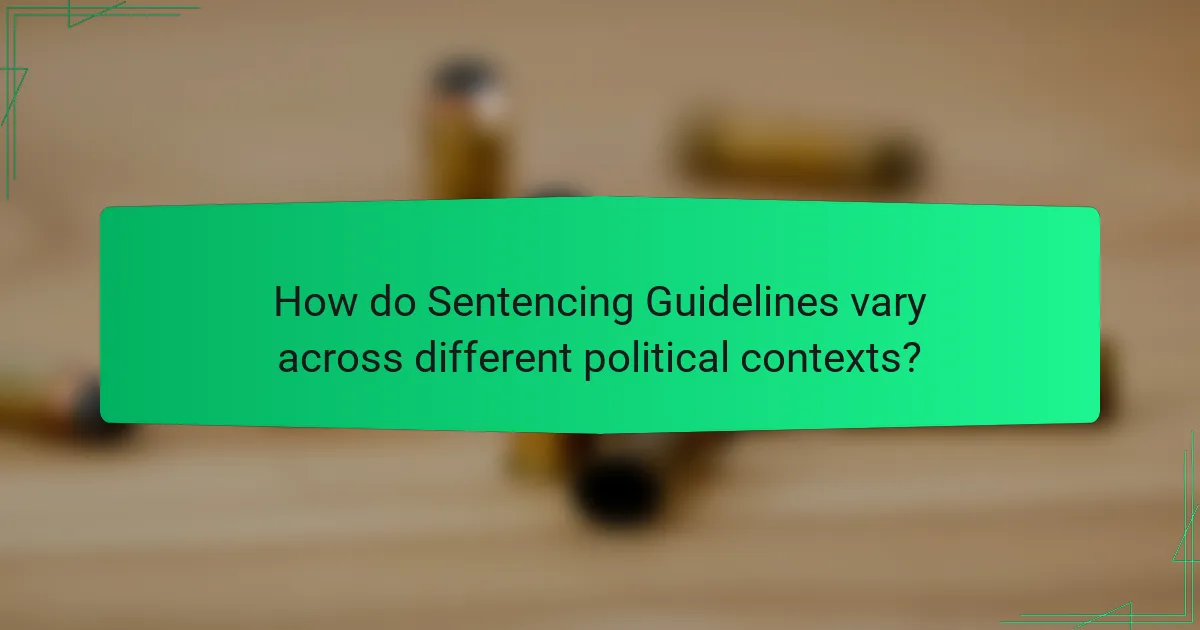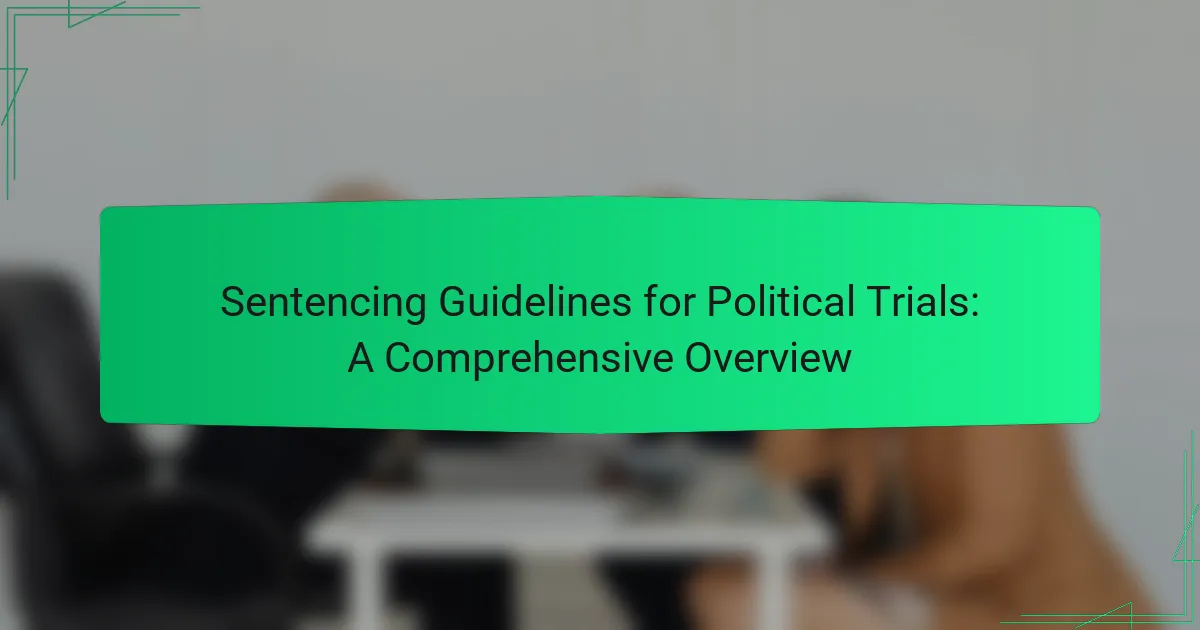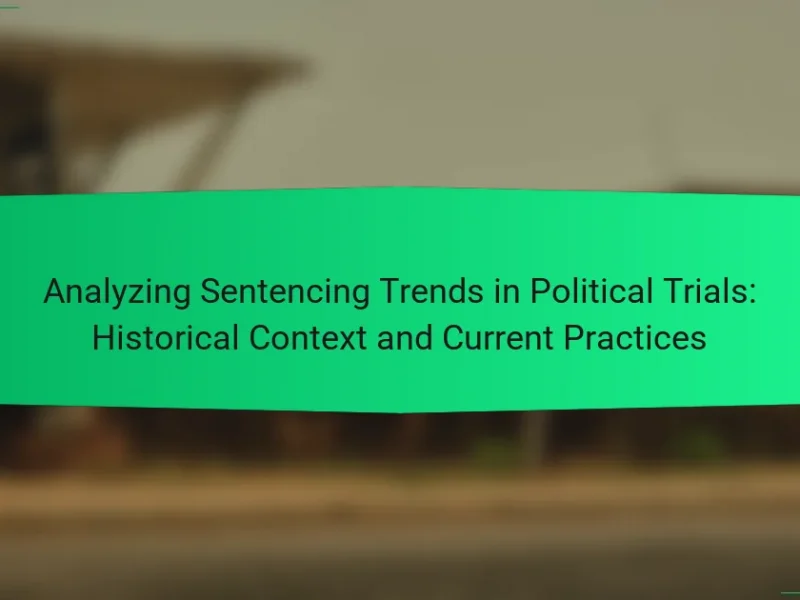Sentencing guidelines for political trials are structured frameworks that establish penalties for offenses related to political actions, ensuring consistency and fairness in judicial outcomes. These guidelines consider various factors, including the nature of the political offense, the defendant’s intent, and the broader impact on public trust. The article explores how these guidelines differ across political contexts, highlighting the contrast between punitive measures in authoritarian regimes and more rehabilitative approaches in democratic systems. Additionally, it discusses best practices for applying these guidelines, emphasizing the importance of impartiality, transparency, and ongoing judicial training to uphold justice and maintain the integrity of the legal system.

What are Sentencing Guidelines for Political Trials?
Sentencing guidelines for political trials are frameworks used to determine penalties for offenses related to political actions. These guidelines aim to ensure consistency and fairness in sentencing. They take into account the nature of the political offense, the defendant’s intent, and the impact on the public. Factors such as the severity of the crime and prior convictions are also considered. In many jurisdictions, these guidelines are influenced by legal precedents and statutory laws. For instance, in the United States, the Federal Sentencing Guidelines provide a structured approach to sentencing. They help judges make informed decisions while balancing the need for justice and the protection of civil liberties.
Why are Sentencing Guidelines important in Political Trials?
Sentencing guidelines are important in political trials because they ensure consistency and fairness in sentencing. They provide a framework for judges to determine appropriate penalties. This framework helps to mitigate biases that may arise in politically charged cases. By adhering to established guidelines, judges can justify their decisions based on legal standards rather than personal beliefs. Additionally, these guidelines promote transparency in the judicial process. They allow for better public understanding of sentencing outcomes. Historical examples show that inconsistent sentencing can lead to perceptions of injustice. Thus, guidelines help maintain public trust in the legal system during political trials.
How do Sentencing Guidelines influence judicial outcomes?
Sentencing guidelines influence judicial outcomes by providing a structured framework for judges. These guidelines establish recommended sentencing ranges for specific offenses. They aim to promote consistency and fairness in sentencing decisions. Judges often rely on these guidelines to reduce disparities in sentencing. For instance, studies show that jurisdictions with structured guidelines have lower variance in sentencing outcomes. This reduces the influence of factors like race or socioeconomic status. Additionally, guidelines can limit judicial discretion, ensuring that similar cases receive similar sentences. Research indicates that adherence to guidelines can lead to more predictable sentencing patterns. Overall, sentencing guidelines play a crucial role in shaping judicial outcomes and promoting equity in the legal system.
What role do Sentencing Guidelines play in ensuring fairness?
Sentencing Guidelines play a crucial role in ensuring fairness in the judicial system. They provide a framework for judges to determine appropriate sentences for offenders. This framework helps to standardize sentences across similar cases. By reducing disparities, the guidelines promote equitable treatment of defendants. They also aim to minimize the influence of bias in sentencing decisions. Research indicates that jurisdictions using guidelines report more consistent sentencing outcomes. For example, the U.S. Sentencing Commission found that federal guidelines led to reduced racial disparities in sentencing. Overall, Sentencing Guidelines enhance the perceived legitimacy of the judicial process.
What are the key components of Sentencing Guidelines for Political Trials?
Key components of Sentencing Guidelines for Political Trials include the nature of the offense, the defendant’s role, and the impact on society. These guidelines assess the severity of the political crime committed. They also consider mitigating and aggravating factors. Mitigating factors may include lack of prior criminal history. Aggravating factors can involve the use of violence or threats. Sentencing ranges are often influenced by statutory requirements. Judicial discretion plays a role in applying these guidelines. Overall, these components aim to ensure consistency and fairness in sentencing political offenders.
What factors are considered when establishing Sentencing Guidelines?
Factors considered when establishing Sentencing Guidelines include the severity of the offense, the defendant’s criminal history, and the impact on victims. The legal framework also takes into account the intent behind the crime and any mitigating or aggravating circumstances. Additionally, societal norms and the need for deterrence play a role in shaping these guidelines. Research shows that consistency in sentencing is crucial for fairness and public trust in the judicial system. Studies indicate that clear guidelines can help reduce disparities in sentencing outcomes.
How do different jurisdictions implement Sentencing Guidelines?
Different jurisdictions implement Sentencing Guidelines through varying frameworks and processes. Each jurisdiction establishes its own set of guidelines based on local laws and judicial discretion. For instance, some jurisdictions use a structured sentencing model that includes specific ranges for different offenses. Others may adopt a more flexible approach, allowing judges to consider mitigating and aggravating factors.
In the United States, federal guidelines are established by the United States Sentencing Commission. These guidelines are advisory but significantly influence sentencing decisions. State jurisdictions may have their own guidelines, which can differ widely in terms of severity and application.
Additionally, some jurisdictions incorporate community input and statistical data to shape their guidelines. Research indicates that jurisdictions with structured guidelines tend to have more consistent sentencing outcomes. This consistency can enhance fairness and reduce disparities in sentencing across similar cases.

How do Sentencing Guidelines vary across different political contexts?
Sentencing guidelines vary significantly across different political contexts. In authoritarian regimes, guidelines may be strict and punitive to suppress dissent. For example, political trials often result in harsh sentences to deter opposition. In contrast, democratic systems may adopt more lenient guidelines that emphasize rehabilitation. This is evident in countries with restorative justice models. Additionally, political climate influences sentencing. In times of political unrest, harsher penalties may be imposed. Conversely, periods of political stability might lead to more lenient applications of guidelines. Studies show that political ideologies shape judicial discretion, impacting sentencing outcomes. Overall, the political environment plays a crucial role in determining the nature and severity of sentencing guidelines.
What are the differences in Sentencing Guidelines for domestic versus international political trials?
Domestic political trials typically follow national laws and sentencing guidelines. These guidelines are often influenced by local legal precedents and statutes. In contrast, international political trials are governed by international law and treaties. They may involve entities like the International Criminal Court (ICC) or special tribunals. Sentencing in these cases can be more variable due to differing legal frameworks across countries. For example, domestic trials may impose penalties based on specific national statutes, while international trials consider broader principles of justice and human rights. The severity of sentences can also differ; domestic trials may result in harsher penalties based on local sentiment, whereas international trials might focus on restorative justice.
How does the political climate affect Sentencing Guidelines?
The political climate significantly influences sentencing guidelines. Changes in administration can lead to shifts in law enforcement priorities. For example, a more progressive government may advocate for reduced sentences for non-violent offenses. Conversely, a conservative administration may push for harsher penalties to deter crime. Public opinion also plays a crucial role. If the electorate demands tougher sentencing, lawmakers may adjust guidelines accordingly. Historical trends show that political movements often correlate with alterations in sentencing practices. For instance, the War on Drugs in the 1980s led to stricter sentencing laws. These shifts reflect the broader societal attitudes towards crime and punishment at any given time.
What unique challenges arise in international political trials?
International political trials face unique challenges such as jurisdictional issues, political influence, and evidentiary standards. Jurisdictional issues arise when multiple countries claim authority over a trial. This can lead to conflicts and complicate legal proceedings. Political influence often affects the impartiality of the trial. External pressures from governments or organizations can sway outcomes. Evidentiary standards may differ significantly between jurisdictions. This can create difficulties in presenting and accepting evidence. Additionally, the political context may impact witness testimonies. Fear of retaliation can lead to reluctance in providing information. These challenges complicate the pursuit of justice in international political trials.
What are the consequences of deviating from established Sentencing Guidelines?
Deviating from established Sentencing Guidelines can lead to significant legal repercussions. Courts may impose harsher penalties or reduce sentences based on the deviation. This inconsistency can undermine the fairness of the judicial process. Additionally, such deviations may result in appeals or challenges from defendants. Legal precedents indicate that adherence to guidelines promotes uniformity in sentencing. Deviations can also affect public perception of the justice system. Ultimately, straying from these guidelines can disrupt the intended balance of justice.
How do deviations impact public perception of the justice system?
Deviations in the justice system can significantly alter public perception. When the system appears inconsistent, trust diminishes. Public confidence is influenced by perceptions of fairness and equality. For instance, high-profile cases with perceived bias can lead to outrage. Research shows that 70% of individuals feel less confident in the justice system after witnessing deviations. Additionally, media coverage often amplifies these perceptions. Coverage of wrongful convictions or lenient sentences can create a narrative of injustice. Such narratives can lead to calls for reform and increased scrutiny of judicial processes. Ultimately, deviations can undermine the legitimacy of the justice system in the eyes of the public.
What legal ramifications can arise from non-compliance with Sentencing Guidelines?
Non-compliance with Sentencing Guidelines can lead to various legal ramifications. Courts may impose harsher penalties than those recommended. This can result in longer prison sentences or increased fines. Additionally, non-compliance may undermine the credibility of the judicial process. It can also lead to appeals or motions for resentencing. In some cases, it may result in a loss of judicial discretion. Violations can attract scrutiny from oversight bodies. Ultimately, these ramifications can affect the fairness and uniformity of sentencing.

What best practices should be followed in applying Sentencing Guidelines for Political Trials?
Best practices in applying Sentencing Guidelines for Political Trials include ensuring impartiality and transparency. Judges should avoid biases related to political affiliations. Consistent application of guidelines across similar cases fosters fairness. Detailed documentation of sentencing rationale is essential for accountability. Consideration of the defendant’s intent and the impact of the offense on public trust is crucial. Engaging legal experts in political contexts can enhance the understanding of complex cases. Regular training on the nuances of political trials for judges is advisable. These practices promote justice and uphold the integrity of the judicial system.
How can judges ensure consistency in applying Sentencing Guidelines?
Judges can ensure consistency in applying Sentencing Guidelines by adhering to established protocols. They should familiarize themselves with the guidelines and understand their intent. Regular training and workshops can enhance their knowledge and application skills. Utilizing a standardized framework for sentencing decisions promotes uniformity. Judges can also reference past cases to maintain consistency in similar circumstances. Transparency in reasoning helps clarify decisions and reinforces adherence to guidelines. Collaboration with other judges in reviewing cases can lead to more consistent outcomes. Lastly, ongoing evaluation of sentencing practices can identify areas for improvement and ensure adherence to guidelines.
What training is necessary for judges handling political trials?
Judges handling political trials require specialized training in constitutional law and human rights. This training ensures judges understand the legal frameworks governing political cases. Knowledge of relevant statutes is crucial for making informed decisions. Judges also need to be trained in recognizing bias and maintaining impartiality. Understanding the political context of cases is essential for fair adjudication. Additionally, training in procedural justice helps judges navigate complex trial processes. Workshops and seminars on political theory can enhance judges’ comprehension of the implications of their rulings. Continuous education on evolving legal standards is necessary for judges to stay updated.
How can transparency in sentencing decisions improve public trust?
Transparency in sentencing decisions can significantly improve public trust in the judicial system. When the rationale behind sentencing is clear, it fosters accountability among judges. Public access to sentencing information allows citizens to understand how decisions are made. This understanding reduces perceptions of bias and arbitrary judgment. Studies show that transparency can lead to increased confidence in legal outcomes. For example, jurisdictions that publish sentencing guidelines often report higher public satisfaction. Enhanced trust can also encourage community cooperation with law enforcement. Overall, transparency serves as a foundation for a fair and just legal system.
What resources are available for understanding and implementing Sentencing Guidelines?
Resources for understanding and implementing Sentencing Guidelines include official government publications, legal textbooks, and online databases. The United States Sentencing Commission provides comprehensive guidelines and resources on its website. Legal textbooks often contain detailed analyses and applications of sentencing laws. Online legal research platforms, such as Westlaw and LexisNexis, offer access to case law and commentary on sentencing practices. Additionally, law schools and legal organizations frequently host seminars and workshops on sentencing guidelines. These resources help practitioners navigate the complexities of sentencing in political trials.
Sentencing guidelines for political trials serve as structured frameworks that determine penalties for offenses related to political actions, ensuring consistency and fairness in judicial outcomes. The article explores the importance of these guidelines in mitigating biases, promoting transparency, and maintaining public trust in the legal system. Key components include the nature of the offense, the defendant’s intent, and the impact on society, while varying implementations across jurisdictions highlight the influence of political contexts. Additionally, the article addresses the challenges faced in international political trials and the consequences of deviating from established guidelines, emphasizing best practices for judges to enhance fairness and accountability in sentencing.


